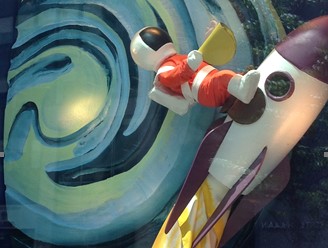What Would Happen If We Lost Satellite Communications?

As if we did not have enough on our plates looking over our shoulder for COVID-19, we now had to look up to the sky for a falling rocket. Chicken Little’s pleas of “The Sky is Falling!” – not so funny. The 100 foot Chinese rocket, claimed to pose no risk as it most likely would burn up in our atmosphere upon re-entry, begs to ask the question: Who is responsible for things that go awry in Space? More chilling, what would happen to humankind if we were to lose a vital satellite?
A satellite is a machine that is launched into space and orbits the earth. It surveys large swathes of land and is useful for meteorological tracking. It facilitates TV and phone communications. It employs the Global Positioning System (GPS) to pinpoint your exact location.
In 2013, BBC released the following headline: “What would happen if all satellites stopped working?”. Overseas, the military would lose track of drones and be vulnerable to attack. Pilots and air traffic control would not be in sync. Fishermen would be lost at sea. Trucks and trains would lose their way. Traffic lights in cities would default to red.
North America would be cut off from other continents. Natural disasters would go undetected. Food supply would run low. The internet would grind to a halt. “Every network controlled by computers is at risk”.
BBC referenced Orson Welles’ “The War of the Worlds”. This play was broadcast over the radio in 1938. A global crisis of this magnitude has not gone unthought of in the past and so we cannot get away with using the word “unprecedented” (like we did with COVID).
Who is responsible? In regard to last month’s falling Chinese rocket, the National Geographic quotes the 1967 Outer Space Treaty, and the 1972 Space Liability Convention. If the Chinese rocket were to incur damage on another’s country’s land and if that country signed the Liability Treaty, then they have the option of going after the country at fault.
But then again, it is an option. Interestingly, the National Geographic offers the precedent of 1978 when a Soviet Union satellite scattered radioactive debris over the Northwest Territories and after the cleanup, Canada sent a bill to the Soviet Union in the amount of $6 million CAD, of which approximately half was paid back.
The Canadian Space Agency, whose offices are based in Saint-Hubert and Gatineau, Quebec, with a lab in Ottawa, also reported in May 2021 that debris hit the Canadarm2, which works with the International Space Station (ISS), an orbiting space research laboratory. As nonchalant as this sounds, the space debris ripped a 5 mm diameter hole in the Canadarm2.
The Canadian Space Agency reports that 23,000 objects are being tracked to anticipate potential collisions with earth’s satellites. At ground level, there is nothing much that a regular civilian can do, but place their trust in the Canadian Space Agency and related partners in safeguarding our satellites and the protection of modern day (comfortable) life.
By the way, that Chinese rocket landed somewhere near Maldives.
The fact that you are reading this article online, somewhere around the world, means that satellites are functioning fully.
For now.



